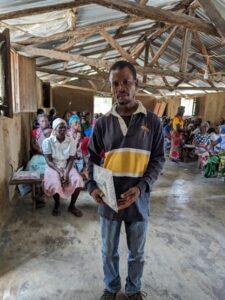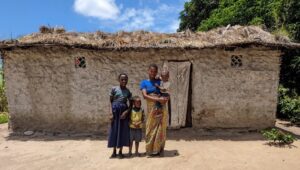‘This is how we know what love is: Jesus Christ laid down his life for us. And we ought to lay down our lives for our brothers and sisters. If anyone has material possessions and sees a brother or sister in need but has no pity on them, how can the love of God be in that person? Dear children, let us not love with words or speech but with actions and in truth. ‘
1 John 3:16-18, NIV
In a church in rural Mozambique, Rosa* approached Terry from Mission Educate and spoke to him with the help of the pastor of her church. What she said to him still brings tears to Terry’s eyes. She said, “All my life I was told that I was worthless.” Then, thinking about the Literacy for Life program Mission Educate and Bible Society Australia are running in her church, Rosa said, “But now, somebody I don’t know, in a place I have never heard of, is investing their money in me, because they think I am worth it.”
“This is the impact Australian supporters can have,” says Terry. “By supporting this literacy program for the people of Mozambique, they are showing people they don’t know, in a place they don’t know, that they are worth the investment. In doing so, they are communicating in the greatest possible way that there is a God who cares for people, and who thinks that they are worth the sacrifice he paid with his Son.”
The challenges facing Mozambicans are significant, having lived under colonial rule for 500 years, suffered 18 years of civil war, and only settled into democratic governance in 1994. Alford from Mission Educate explains that for as long as they can remember, “people have been trying to find ways to survive.” Of the 32 million people living in Mozambique, more than half are living below the poverty line, 67% live as subsistence farmers, and 42% are non-literate; there are 16 million people in Mozambique who can’t read and write, and most of them are over the age of 40.
Colonialism has left the people of Mozambique with a very low sense of self-esteem, which is exacerbated by poverty and illiteracy. Terry explains, “The men especially feel a large degree of shame because they recognise that they are living in a changing society, and they are not able to provide for their families because they can’t read and write. Right down the simplest areas of life, that we in Australia just take for granted, Mozambicans are denied access. People who can’t read and write are dependent on others to tell them what to do, and they never know whether they are being told the right thing. So they have this sense of inferiority.”
Mission Educate, with the support of Bible Society Australia, runs the Literacy for Life project in three provinces across the country, and directly reaches over 500 Mozambicans each year with literacy skills. Terry explains, “The first step out of that sense of inferiority is to be able to read and write.”
Alford notes that centuries of oppression make it challenging for people in Mozambique to even see opportunities for their future. This is the case especially in rural areas, where people live as subsistence farmers, and have low expectations for their lives. “They don’t know what it is to have opportunities.”
The Literacy for Life program is delivered by Mozambicans, trained by Mission Educate as facilitators, so students know that they are working with teachers who understand their culture, and understand them. Where possible, classes use mother tongue languages to launch into teaching the official language, Portuguese. “We’re talking to them in a language they understand, to teach them to read a language that they don’t understand. For life in Mozambique, they’ve got to be able to speak and read Portuguese.”
Terry explains that in the Literacy for Life schools, “We’re trying to teach our students the ability to dream, and to give them the opportunity to actually fulfil their dreams with their education.” The Literacy for Life program offers students the chance to achieve their Primary Equivalent certificate (with the support of the government), and to learn basic skills to improve their livelihood. “Literacy is a seed for dreaming,” explains Terry. As students learn to read and write their name, they see opportunities open up: “I can write my name. Maybe I can improve my agriculture. Maybe then I could start my own business. Maybe then I could go out and do other things.” As Terry observes, “It all starts with literacy. Literacy and the ability to dream go hand in hand.”

Bruno* was born in the village of Marromeu. When he was a boy, he underwent much suffering; his parents were farmers and were unable to produce enough to sustain his family. Although at 10 years old, Bruno wanted to learn to read and write – and study nursing to help the people in his community – it wasn’t possible, as he had to help his parents in the field rather than attend school. Then, five years later, he was forced to marry. “Once I was married, my dreams fell apart because of my new marital responsibilities,” Bruno recalls. He and his young wife survived by selling charcoal. Then Bruno’s life took a turn for the better when he was offered the chance to study in the Literacy for Life Project. “It came at a time when I needed it so much,” he says. “Today I’m at a second-grade standard and I’m very proud that I’m gradually fulfilling my dream,” Bruno knows that “God will give me the grace to finish the literacy course so that I can fulfil my dream.”
He is particularly grateful for the courses in agriculture included in the literacy project. “Farming is one of the community’s main sources of livelihood. We are learning to read and write and improve the production of vegetables to feed our families. We thank God for all that Bible Society Australia and Mission Educate are doing to transform our lives.”

Aya* always had a dream of becoming a primary school teacher. Yet she knew that, “my dream was far from me because I was unable to read or write.” Then, when she was in her 30s, now a wife and mother of four children, Aya heard about the Literacy for Life project. She immediately enrolled. “I could finally see an opportunity to pursue my dream,” Aya says, given the chance to complete the literacy course, receive her Primary Equivalency Certificate, then move into secondary education. “Today, as a result of my studies, I can completely master the letters of the alphabet, write my name and write a letter. I am waiting to sit the exam in 2025.”
Aya expresses her gratitude to Bible Socety Australia supporters for providing Mozambicans with all the necessary materials they need. “[Your] investment into the Mozambican community is changing lives in this century,” says Aya. “I have faith in God that my dream will come true because our God is the God of the impossible.”
To support this literacy program, and more, visit biblesociety.org.au/sow
______
*Names changed to protect privacy